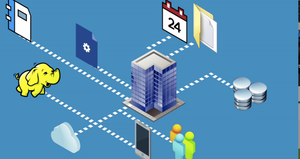5 Things You (and Your Clients) Need to Know about vSphere 6.5
VMware vSphere, the next-generation infrastructure for next-generation applications, has been updated with a number of new capabilities.
December 21, 2016

Sponsored Content
 VMware vSphere, the next-generation infrastructure for next-generation applications, has been updated with a number of new capabilities.
VMware vSphere, the next-generation infrastructure for next-generation applications, has been updated with a number of new capabilities.
The vSphere platform has always provided a powerful, flexible, and secure foundation for running, managing and securing applications, but with Version 6.5 the platform simplifies the customer experience for automation and management at scale. It offers comprehensive built-in security for protecting data, infrastructure and access and provides a universal application platform for running any app anywhere. This is especially important now that companies are increasingly pressured to deploy and update applications almost in real time to meet customer demand. MSPs who are leveraging vSphere and other products in VMware’s ecosystem should consider how the vSphere update will affect their operations and the services they can provide to their clients.
Here are five things you—and your clients–need to know about vSphere 6.5:
1. vCenter Server Appliance anchors updates.
The vCenter Server Appliance is at the heart of the updates to vSphere. The installer’s look and feel has been updated in general, and support has been added for Linux and Macintosh operating systems (in addition to Windows). Other updates to the appliance include:
The migration tool allows for more granular selection of migrated data
Improved appliance management
VMware Update Manager is now part of the vCenter Server Appliance
Native high availability
Built-in backup and restore
2. Improvements to current web client focus on user experience.
While VMware continues development of an HTML 5-based vSphere Web Client, the company has made some improvements to the current, Adobe Flex-based client. The updates aren’t huge, but they are focused on the user experience and so will have a relatively high impact. These improvements include:
Inventory tree is the default view
The home screen reorganized
The “Manage” tab has been renamed “Configure”
The “Related Objects” tab has been removed
VM rollup at 5,000 instead of 50 VMs
Live refresh for power states and tasks
3. vSphere Client runs along-side the Web Client.
In vSphere 6.5 there is a fully supported version of the HTML5-based vSphere Client that will run alongside the vSphere Web Client. The vSphere Client, which is built into vCenter Server 6.5 and is enabled by default, does not yet have full feature parity, but VMware is prioritizing the day-to-day tasks of administrators. The company is also seeking feedback on what the client needs to enable customers to use it full time. Benefits of the new vSphere Client include:
Clean, consistent UI built on VMware’s new Clarity UI standards
Cross-browser and cross-platform application
No browser plug-ins to install/manage
Integrated into vCenter Server for 6.5 and fully supported
Fully supports Enhanced Linked Mode
4. MSPs can gain ongoing experience with the vSphere Client.
VMware flings are apps and tools that users can explore and provide feedback on. This provides an opportunity to gain familiarity with the client, but user feedback also provides VMware with data on what features and capabilities should take priority as it continues to develop the platform. So far, according to VMware, there has been positive feedback on the performance of the vSphere Client Fling. You can access and explore the vSphere Client Fling here, basing your testing on the needs of your own customers.
5. New capabilities ease patching, upgrading and management of ESXi hosts.
Version 6.5 of vSphere adds more powerful capabilities for patching, upgrading and
managing the configuration of VMware ESXi hosts. vSphere Update Manager is still the preferred method for keeping ESXi hosts up to date, but with vSphere 6.5 it has been fully integrated with—and streamlined by–the vCenter Server Appliance.
VMware vSphere 6.5 can be downloaded here.
For more information on the Software-Defined Data Center please visit http://www.vmware.com/software-defined-datacenter/index.html.
You May Also Like
